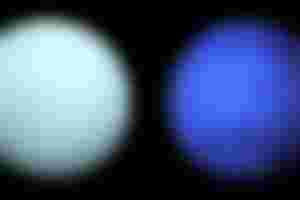
Hello everyone.. This actually is my first article and this is on a mind-blowing topic. Raining diamond on Neptune and Uranus... Here is the interesting reason I found out..
Scientists don't know much about the ice giants on the other end of our solar system. They're a constant source of mystery and intrigue.
Take the conundrum, for example, of how the chemical reactions inside of Neptune and Uranus may cause diamonds to rain down on the planets' cores. Under immense pressure deep below the planets' surfaces, carbon and hydrogen atoms are smushed together, forming the crystals.

Helmholtz-Zentrum Dresden-Rossendorf research institute in Germany, said in a press statement. "This will become ever more relevant the more exoplanets we discover." Kraus and his team conducted the experiments at the SLAC National Accelerator Laboratory at Stanford University.
To better understand how this molecular magic happens, the researchers recreated the diamond rain within Neptune's core in the lab. Instead of using methane, which would be found inside the ice giants, as their sample, the scientists used the hydrocarbon polystyrene (C8H8), known colloquially as Styrofoam.
Kraus and his colleagues applied heat and pressure to the polystyrene and then used an optical laser to generate shockwaves that rippled through the material. When those shockwaves met, temperatures soared to 8,540 degrees Fahrenheit. (Earth's core, for reference, is about 10,800 degrees Fahrenheit.) Pressure within the material also skyrocketed
"We produce about 1.5 million bars, that is equivalent to the pressure exerted by the weight of some 250 African elephants on the surface of a thumbnail," Kraus said.

The scientists then used SLAC's Linac Coherent Light Source (LCLS) instrument to direct X-rays at the sample and measure how light bounced off of electrons inside it. For the first time, they watched the chemical reaction inside the non-crystalline substance unfold. The hydrocarbons split apart; the carbon rapidly converted to diamond and sank while the hydrogen escaped.
Kraus says the experiment may explain why Neptune's core produces a perplexing amount of energy—more than twice the amount it absorbs from the sun. These sheets of diamonds, the researchers suspect, could generate gravitational energy and subsequently heat energy as they rain down on the planets.
Ultimately, the experiment will help scientists solve mysteries here in our own solar system and in distant star systems.
There are most interesting facts about science which are unknown... I will try my best to research more and bring you the best of information. Please subscribe for more interesting facts.. Let's share our ideas on this topic. I hope you loved it... Thank you.



A pretty good one ..